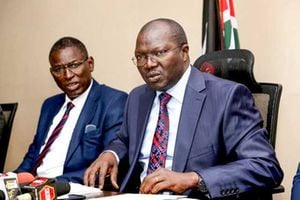County dissolution rules need review

Taita Taveta Governor Granton Samboja. He has initiated the suspension of the county government over a 2019/2020 budget impasse between the executive and the county assembly. PHOTO | FILE | NATION MEDIA GROUP
What you need to know:
- A budget stalemate should constitute neither an internal conflict nor an exceptional circumstance.
- The Intergovernmental Relations Act only provides for disputes between the two tiers of government and between county governments.
Taita-Taveta Governor Granton Samboja has initiated the suspension of the county government over a 2019/2020 budget impasse between the executive and the county assembly.
He reckons that the MCAs’ decision to allocate Sh830 million to the development fund out of a Sh5.3 billion budget will imperil the operations of the county.
Mr Samboja has flatly refused to submit the Appropriation Bill for consideration by the county assembly, though it ought to have been passed by June 30.
Section 134 of the Public Finance Management (PFM) Act 2012 contemplates such a situation and gives the county assembly the power to authorise withdrawal of up to 50 per cent of the amount in the estimates submitted to it until the appropriation law is passed. Will it invoke the provision to enable the county meet its obligations, including the MCAs’ salaries?
The governor collected signatures of Taita-Taveta residents in support of the petition to the President. If actualised, the MCAs and the governor must seek a fresh mandate.
The move is a major test on the doctrine of sovereignty of the people.
SUSPENSION
Article 192 provides for only two circumstances which can trigger a suspension: In an emergency arising out of internal conflict or war, or in any other exceptional circumstances.
The County Government Act defines exceptional circumstances as actions by the county government that are against the common needs and interest of the local citizens.
After he receives a petition signed by not less than 10 per cent of the registered voters in the county, the President should table the petition to the Summit for approval and, if approved, appoint an independent commission of inquiry to investigate the allegations.
If satisfied, he forwards the petition, recommendations and the report of the commission to the Senate for its approval, upon which he gazettes the suspension of the county government.
Interestingly, the Senate has the power to lift the suspension in 90 days. If not lifted, election of a new county government are held. Then, the county executive stands suspended and the county assembly prorogued. The County Speaker and the MCAs remain in office on half pay. The President then appoints an interim county management board.
By giving the Senate the power to terminate a suspension, however, the Constitution, though silent about it, affords an opportunity for alternative dispute resolution. It also allows room for an appeal.
BUDGET STALEMATE
A budget stalemate should constitute neither an internal conflict nor an exceptional circumstance. In any event, both Houses of Parliament are yet to agree on the Division of Revenue Bill and that cannot be a ground enough to dissolve the Government of Kenya!
It is not lost on Kenyans Makueni Governor Kivutha Kibwana, in his first term, faced a similar impasse over 2013/2014 budget and sought dissolution of the county government.
The commission cautiously made a finding that the litany of failures — like the budget impasse and gunfight in the county assembly — did not meet the constitutional threshold for suspension or eventual dissolution of a county government. It said it would be grave to eject a democratically elected government and the powers should be used sparingly.
But a fundamental question lingers: If, say, 60 per cent or more voters seek the suspension of the county government for not honouring the social contract between them, can the President or the Senate trump over their sovereign power to put in a new one?
John Locke, the father of liberalism, asserts that should a government breach the social contract, it forfeits the power the people put in its hands and devolves it to the people, who have the right to resume their original liberty to establish a new one. But the jury is still out!
DISPUTE RESOLUTION
This stalemate should also provoke the policymakers to rethink about our dispute resolution mechanism between the two arms of the county governments. The Intergovernmental Relations Act only provides for disputes between the two tiers of government and between county governments. No focus to disputes of the nature in Makueni, Taita-Taveta or those pitting the National Assembly on the one side and the Senate and Council of Governors on the Division of Revenue Bill.
There is a need for dispute resolution mechanisms that demand of the players to make every reasonable effort to exhaust all remedies before moving to court or pursuing the drastic route of dissolution.
It appears that a democratically elected government, just like marriage, is a darling of the law and the law seeks to preserve the status quo unless demonstrated that resolution has failed.
Mr Ndiani is an advocate of the High Court of Kenya. [email protected].





